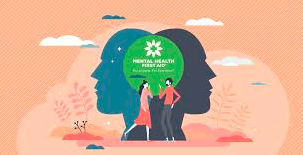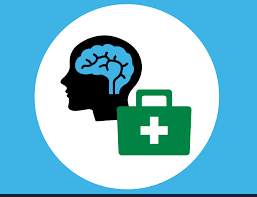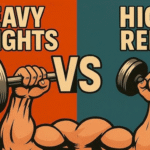Mental Health First Aid: A Complete Guide
Introduction
Mental health has become a global concern, impacting individuals, families, workplaces, and communities. While many people are familiar with traditional first aid for physical injuries, fewer understand how to respond effectively to mental health challenges. Mental Health First Aid (MHFA) is a valuable program designed to equip people with the knowledge and skills to provide initial support to someone experiencing a crisis or developing a mental health problem.
This article explores what Mental Health First Aid is, why it matters, how it works, and how you can benefit from it in both personal and professional settings.
What Is Mental Health First Aid?
Mental Health First Aid is an evidence-based training program that teaches people how to recognize, understand, and respond to signs of mental health issues. Much like traditional first aid, MHFA provides immediate assistance until appropriate professional help is available.
The program covers a wide range of conditions, including:
- Anxiety and panic attacks
- Depression
- Substance use disorders
- Suicidal thoughts or behaviors
- Psychosis and schizophrenia
- Trauma-related conditions
By learning Mental Health, individuals gain the confidence to offer reassurance, listen without judgment, and guide others toward professional care.
Why Mental Health First Aid Matters
Growing Mental Health Challenges
The modern world has brought increased stress, social isolation, and workplace pressures. As a result, mental health concerns are more widespread than ever before. According to the World Health Organization (WHO), one in four people will experience a mental health condition at some point in their lives.
Reducing Stigma
Mental health issues often carry stigma, leading many to avoid seeking help. Mental Health First Aid helps break down barriers by encouraging open conversations and normalizing mental health support.
Saving Lives
Just as CPR can save someone experiencing cardiac arrest, Mental Health First Aid can save lives by providing timely intervention and preventing crises from escalating.
Key Components of Mental Health First Aid Training
The ALGEE Action Plan
At the core of MHFA is the ALGEE model, a practical framework that guides first aiders in responding to someone in distress:
- A – Assess for risk of suicide or harm
Check for immediate danger to the person or others. - L – Listen nonjudgmentally
Provide a safe, supportive space for the individual to share their feelings. - G – Give reassurance and information
Normalize their experience and share helpful facts about recovery and resources. - E – Encourage appropriate professional help
Suggest professional services such as therapy, counseling, or hotlines. - E – Encourage self-help and other support strategies
Promote healthy lifestyle choices and peer or family support networks.
Interactive Learning
Mental Health First Aid training often includes role-playing, group discussions, and case studies. This practical approach ensures participants can confidently apply what they learn in real-life situations.
Benefits of Mental Health First Aid
Individuals
- Confidence to support friends, family, or colleagues
- Improved communication and listening skills
- Reduced fear or hesitation in approaching sensitive situations
Workplaces
- Enhanced employee well-being
- Reduced absenteeism and turnover
- Stronger team cohesion and morale
Communities
- Greater awareness of mental health
- Increased resilience and support networks
- Reduced stigma and discrimination
Who Should Take Mental Health First Aid?
Mental Health is designed for everyone, not just healthcare professionals. It is particularly beneficial for:
- Teachers and school staff
- Human resource professionals
- First responders
- Parents and caregivers
- Community leaders
- Workplace managers
By making Mental First Aid a shared responsibility, communities can become safer, more supportive environments for all.
How to Get Certified in Mental Health First Aid
Step 1: Find a Course
Search for accredited MHFA training providers in your area or online. Many organizations offer virtual options to increase accessibility.
Step 2: Complete the Training
Most courses range from 8 to 12 hours and include interactive activities, videos, and group exercises.
Step 3: Earn Your Certificate
After completion, you receive a Mental Health First Aid certification, valid for a certain period (often three years). Refresher courses are recommended to stay updated on best practices.
The Impact of Mental First Aid in Everyday Life
Mental Health has transformed the way people respond to crises. For example:
- A teacher trained in MHFA may recognize early signs of depression in a student and guide them toward support.
- A workplace manager might use MHFA skills to de-escalate stress-related conflicts among employees.
- A family member trained in MHFA can intervene compassionately when a loved one experiences panic attacks.
These real-world applications highlight the practical power of Mental Health in building healthier, more understanding communities.
Mental Health First Aid and Workplace Wellness

Today, many organizations prioritize mental health and wellness programs. By integrating MHFA into workplace training, businesses can:
- Foster a culture of empathy and support
- Equip managers with tools to handle sensitive issues
- Provide employees with resources to maintain mental well-being
Workplaces that invest in Mental Health often see higher productivity, improved morale, and stronger retention rates.
Future of Mental First Aid
As mental health awareness continues to grow, Mental Health is expected to expand worldwide. Digital platforms now offer online training modules, making it easier for individuals to acquire these essential skills. Additionally, governments and healthcare organizations increasingly endorse MHFA as part of public health strategies.
By making MHFA as common as CPR, societies can better prepare to respond to the mental health needs of future generations.
Conclusion
Mental Health First Aid is more than just a training program—it is a movement that empowers individuals and communities to care for one another. By learning MHFA, you gain the tools to recognize, respond to, and support someone experiencing a mental health challenge. Whether in schools, workplaces, or communities, this training can save lives, reduce stigma, and build stronger human connections.
If you are looking for a meaningful way to contribute to a healthier society, consider enrolling in a Mental Health course. The knowledge you gain could make all the difference in someone’s life.
FAQs About Mental Health First Aid
1. What is the purpose of Mental Health First Aid?
Mental Health equips people with the skills to recognize early signs of mental health issues, provide support, and guide others toward professional help.
2. How long does it take to complete Mental Health training?
Most MHFA courses take between 8 and 12 hours, spread over one or two days, depending on the provider and format.
3. Is Mental Health only for professionals?
No. MHFA is designed for everyone, including teachers, parents, coworkers, and community members—not just healthcare professionals.
4. Does Mental Health training include suicide prevention?
Yes. The program covers assessing suicide risk and providing immediate, supportive assistance until professional help is available.
5. Is Mental Health certification worth it?
Absolutely. Certification not only provides valuable knowledge but also boosts confidence in handling mental health situations at home, work, or in the community.





